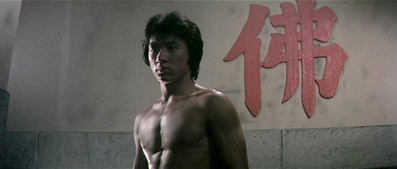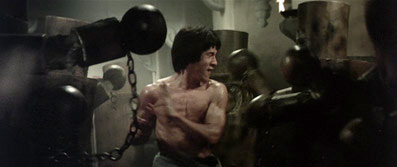|
Shaolin
Wooden Men
(Shao Lin mu ren xiang, aka 36
Wooden Men, aka Shaolin Chamber of Death)
is one of those early Jackie Chan films that many fans are
discovering retrospectively. Made before his considerable
credentials as Hong Kong cinema's leading comic acrobat
had even been established, let alone reached the West, this
is Jackie Chan the emerging kung-fu star and potential Bruce Lee successor.
Chan had yet to take full control of his own projects at this time and
his films from this period have thus proved uneven in quality,
to say the least. Shaolin Wooden Men was
certainly a title new to me when its DVD release was first announced, and researching
the film I encountered some rather negative reaction, as
well as a few hearty shouts of support.
It's not hard to
see why some would complain – martial arts cinema
runs largely to a formula, and fiddle with that in any significant
way and you're asking for trouble. Let's
be clear on this, in terms of plot, Shaolin Wooden
Men follows genre expectations to the letter. Chan
plays a young mute trainee at a Shaolin temple. He's slower
and weaker than his fellow students, who mock him at every
turn, but driven by determination and the memory of his
father's murder, he perseveres. After learning a bit of
drunken kung fu by watching a monk who's a bit too fond
of his wine, he one night follows two other monks into a
forbidden area in the monastery and discovers a man who
has clearly been in chains for some time, although that
hasn't dampened his contempt for his captors. Chan brings
him food and wine, and the man repays him by helping him to develop his fighting skills, skills that a woman named
Five Plumbs, a friend of the Shaolin who lives nearby, aids
him into perfecting. When his training is complete, he is ready
to fight the Shaolin Wooden Men of the title.

OK,
these guys have taken more flack than anything else in the
film, even from fans. They are supposed to be the ultimate
test of a student's skill, and anyone who foolishly takes them
on before he is ready is brought back into the monastery
a broken and bleeding man. The Wooden Men are exactly that,
constructed fighters that line a corridor and, operated
by levers and chains, bash the crap out of anyone not fast
enough to avoid their blows. Except their movements and
speed are limited and I have a feeling even I could give
them the slip on a good day. But stylistically this is a
memorable and inventive sequence and should find particular
favour with video game fans – the Wooden Men were the direct
inspiration for the Mokijin character in Tekken 3,
while Chan's step-by-step approach to navigating the corridor
has a distinctly Tomb Raider ring. There are more
flashback thrills at the end of the corridor, when Chan
has to lift a cauldron that burns the Shaolin Temple emblems
into his forearms, a sight that will be familiar to
anyone who remembers Kwai Chang Caine's identical departure
from his own monastery in the 1972 TV series Kung
Fu (there's also a blind monk to offer special
training tips to Chan, the film's equivalent of Kung
Fu's famed Master Po).
But
it's this first half that is likely to give the impatient
the most problems – there's no real fighting, the training
sequences are brief and unspectacular, and there's certainly
nothing to laugh about. It's fair to say that until Chan
leaves the monastery, Shaolin Wooden Men
is less a martial arts film than a straight drama. Which
is fine, except this occupies almost the first hour of the
film, over half the running time. You can see why the action
junkies get fidgety. But if you've a little patience and
are prepared to accept this confounding of expectations then you should be able to appreciate this first half for
its very real qualities, for its stylised theatrical opening,
its dramatic intrigue, its inventive lighting and
camera placement, its lively editing, and especially
for Chan himself, who delivers another of those nicely low-key
performances that make his early work so interesting, showing
the sort of controlled subtlety here that you'd be pushed
to find in his later work. And I'm not knocking the later
work. No sir.
Once
Chan is on the streets we're in more familiar territory,
as he makes friends and sorts out the bullies at the local
eatery, helps the prisoner who trained him, has a change
of heart about who his friends really are, and locates the
bastard who killed his father, setting the film up for an
energetically choreographed final fight. The pace is particularly
brisk in part 2, and in that final fight Jackie finally
gets to show what he's made of, both as martial arts star
and action director.

Shaolin
Wooden Men may try the patience of genre fans looking
for non-stop action or those who prefer their Chan films
for have a comic edge, and this is probably not the best
film to illustrate to non-martial arts fans the genre's
particular and peculiar appeal. But it's still a stylish,
engaging and well-made film that has been singled out
by some as one of the best of Chan's early works. Despite
the shortage of the sort of eye-popping action usually associated
with the star, I see no reason to disagree.
Another
title in Hong Kong Legends' Ultrabit series, but one that
thankfully improves a great deal on the Magnificent
Bodyguards DVD, whic remains the weakest transfer
released under the Ultrabit banner. The main casualty to
age here appears to be colour, which wanders from pretty good
to seriously drained, but in other respects the picture
quality is very impressive, with detail and contrast the
equal of many a more recent release and black levels – notably
in the stylised opening sequence – absolutely rock solid
(there are a couple of shots where blacks slip to grey,
but not enough to worry about). I'll wager that this is
easily as good as the film has looked since it's first
cinema release. Small instances of dirt and damage are occasionally
visible, but are infrequent. Framing is 2.35:1 and the picture
is anamorphically enhanced.
The
original Chinese mono is joined by Chinese and English 5.1
remixes. The mono track is a little primitive with some
dialogue distortion and the 5.1 certainly improves this
a bit, although the surrounds are only used by accident.
One problem with the 5.1 track is that a few of the contact
sound effects appear to be very slightly out of sync – running
the same sequence with the mono track reveals no such problem.
It's not all of the way through or every sound effect, but
it does notice. The English dub is, in sound quality at
least, somewhere between the Chinese mono and 5.1 tracks,
better than the former but not as good (if that's the word)
as the latter.
Just
3 Trailers for other HKL Chan
releases. All rather disappointing again, although the lack
of an Andrew Staton commentary on this one has caused me
no lost sleep.
A
nice rediscovery for genre fans and a decent restoration
job. The lack of extra features is once again a disappointment,
but collectors will be happy to get the film in good condition,
minor sync issues notwithstanding.
|